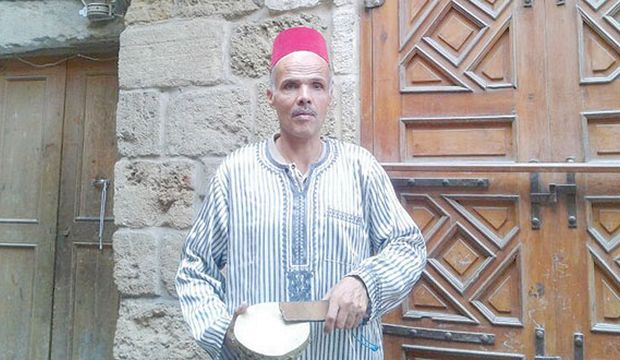Beirut, Asharq Al-Awsat—Late at night, during the holy month of Ramadan, a mesaharati makes his way through the alleyways of Sidon in Lebanon. He bangs his drum, recites poetry, and calls out to the people to wake them for their pre-dawn suhoor meal, their final chance to have a snack and a drink before the next day’s fast.
The mesaharati is a tradition which many Lebanese people have been accustomed since childhood. A male or female town crier only employed during the 30 days of Ramadan, the mesaharati is a reassuring presence during the holy month, and serves as a reminder of a bygone age.
Although still prominent in many Lebanese cities and towns observing the holy month, in Beirut the mesaharati has become something of a rarity. If you do happen to see one—in the alleyways of Barbour Street, Al-Mosayteba or Ras El-Nabaa—they are likely to be wearing modern clothing. In recent years they have begun using an audio recording or even to alert people via text message, eschewing the traditional method.
But the situation is different in the southern city of Sidon. Here, the mesaharati still wear their traditional dress—usually a gown and a tarboush or a fez in the case of males—calling out their poems in praise of God.
Abbas Qatish, 52, is considered Sidon’s best mesaharati. He refuses to use any modern equipment for his job, which he describes as his “mission,” and happily walks tens of miles every evening. Qatish waits patiently outside the houses in the alleyways of the Old City—Sidon’s Mamluk-era medieval core—until the residents have switched on their lights. That way, he is sure they have heard his call.
Speaking to Asharq Al-Awsat, Qatish says he used to follow the mesaharati in the Old City as a child, listening to and reciting the poems until he was finally able to master the art. “I also made drums using leather and copper,” he says.
Qatish believes Sidon will maintain its mesaharati tradition because the new generation is just as eager to learn the skills of the job, adding that some parents “wait with their children for the moment I pass by in order for the kids to learn the profession.”
The residents of the Old City are familiar with Qatish’s voice. He began his work there as a mesaharati nearly 20 years ago, becoming more prominent in the area after his older predecessor, Mohamed Sanas, left the town to practice the profession in New Sidon.
Qatish’s nightly tour of the Old City’s 50 lanes takes nearly two-and-a-half hours and begins at 1 am. He starts by beating his drums lightly while reciting “Awake sleepers, praise God.” The beats then progressively quicken before Qatish recites a poem or a supplication. “Some people who sleep deeply prefer to use an alarm clock, fearing that they may not hear my drums,” he says.
Qatish, who works in the public service sector throughout the rest of the year, says there have been many changes in the profession over time “[Today] there are mesaharatis who use CDs instead of singing with their natural voice. There are others who no longer wear the [gown and the tarboush] and no longer respect the profession”.
Qatish also practices in the resorts and parks dotted around Sidon. He says: “People ask me to go to these places to praise God during this holy month. I perform my supplications, and they repeat after me.”
According to Qatish, the attributes every mesaharati should possess are physical fitness and good health. He says: “This is because he is required to walk long distances every day. He should also have a loud voice and good lungs, as well as an ability to read poems. A mesaharati should supplicate God throughout the night to wake the sleepers.”

